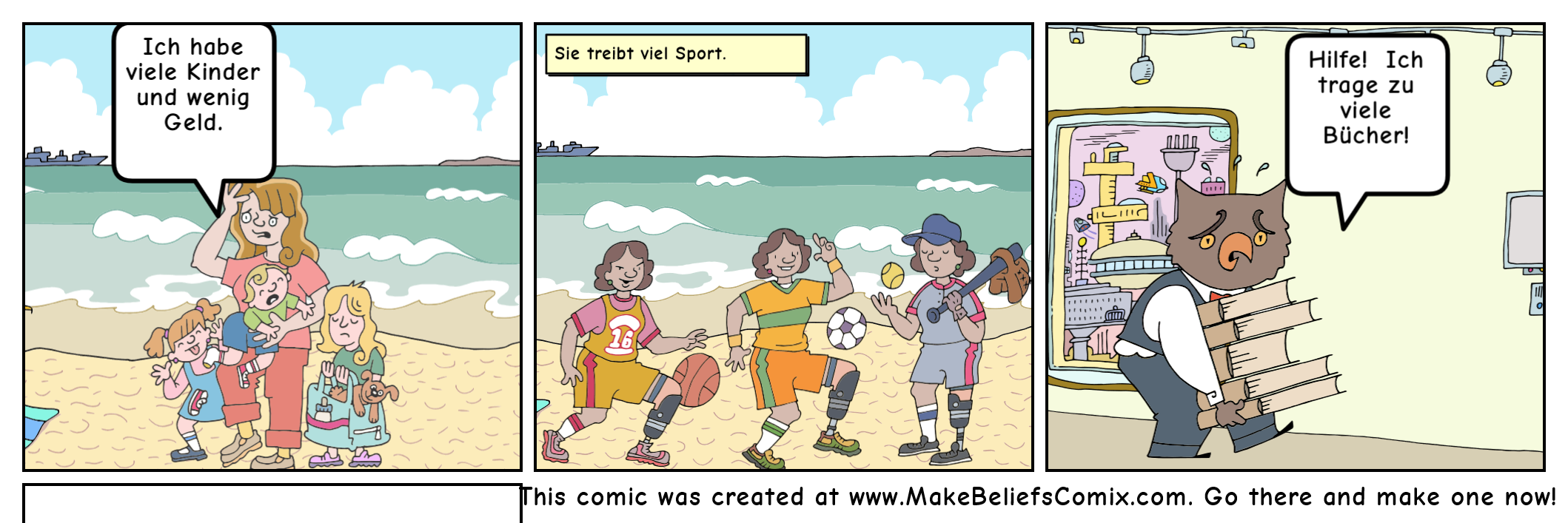28 Section 3-4: WAVEM Words (Adjectives of Indefinite Number)
3.4: WAVEM Words–Adjectives of Indefinite Number
When specifying quantities, we often use words that don’t give an exact number, such as “many,” “few,” or “some.” German also has adjectives of indefinite number. In this book, we will use the acronym WAVEM to remember them.
 WAVEM
WAVEM
W—wenig/wenige little/few
A—andere other
V—viel/viele much/many
E—einige some
M—mehrere several
The WAVEM words that you see above that end in –e are plural. That means you will only use them in front of plural words.
- W: Wenige Kinder machen gern Hausaufgaben. (Kinder = plural)
- A: Andere Unis sind nicht so preiswert. (Unis = plural)
- V: Viele Studenten lernen eine Fremdsprache. (Studenten = plural)
- E: Ich finde einige Kurse langweilig. (Kurse = plural)
- M: Meine Großeltern kaufen mehrere Bücher. (Bücher = plural)
However, you will notice that there are two variations of viel/viele and wenig/wenige. How do we know which one to use?
viel—much wenig—little
viele—many wenige—few
The ones that end in –e will still be plural. We use viel or wenig when we are talking about collective items.
What is a collective item? Things that we usually don’t count out separately, such as rice, money, time, or fish. In English, we use “much” to say that we have a lot of these items.
How much money do you have?
(Not, “how many money,” which would sound strange.)
Similarly, in German, we do the same.
Wie viel Geld hast du?
(Because „Geld“ is not plural).
However, if I want to say I have a lot of things that are typically plural in English, we will use viele in German.
Wie viele Freunde hast du?
(Because „Freunde“ is plural).
It works the same with wenig/wenige. Use wenige for plural items; use wenig for collective items.
Ich habe wenig Geld. (I have little money.)
Ich habe wenige Freunde. (I have few friends.)

Watch Learn German’s video to see a review of viel vs. viele.
Watch Anja’s video to see even more examples.
Ex. B: Was essen Sie? Essen Sie viel/viele oder wenig/wenige? Trinken?
Beispiel: Ich esse viel Brot. Ich esse wenige Chips…usw.

Ex. C: Wo isst man…? Using the list from the previous exercise, answer the following questions. Include viel/viele or wenig/wenige in your answer.
- Wo isst man viel Reis?
- Was isst man in Amerika?
- Wer isst viele Gummibären?
- Wo isst man viel Salat?
- Wo isst man viel Fleisch?
- Was isst man in Deutschland?
- Was isst man in Frankreich?
- Was isst mann auf Hawaii?
- Was essen Vegetarier?
- Was essen Kinder?
- Was trinken Studenten?
- Was trinkst du?
Ex. D: Auf Englisch! Übersetzen Sie ins Englische!
- Unsere Eltern kaufen viel Obst und Gemüse.
- Mein Neffe trägt viele Pullis.
- Der Student trinkt wenig Milch.
- Die Kinder haben andere Freunde.
- Mehrere Cousinen besuchen uns nächste Woche.
- Einige Cousinen kommen aus Europa; andere wohnen in Asien.
- Frau Bauer, warum essen Sie wenig Joghurt?
- Der Professor schreibt mehrere Bücher über Kunst.
- Die Lehrerin liest einige Romane von Jane Austen.
Ex. E: Auf Deutsch! Übersetzen Sie ins Deutsche!

- Many students drink a lot of coffee.
- Other students drink too little water.
- Many mountains are in the west.
- Some mountains are in the east.
- Marianne buys too much pasta.
- My brother eats little meat, but I eat a lot of meat.
- Mrs. Piepke, do you have other children?
- Few teenagers work after school.
- Several tourists like to hike in Germany.
Ex. F: Was gibt es bei Ihnen? Using the landscape words at the beginning of Chapter 3, describe your hometown or state? What is there a lot of or little of?
Beispiel: Es gibt viele Autos. Es gibt wenige Bäume. Es gibt viele Seen…usw.
Ex. G: Fragen. Listen to Silvia from AudioLingua introduce herself. Write three or four questions that could answer what she mentions about herself. (Hint, one of them should use “viele”.)
Sesamstraße: Watch the video to see Grobi (Grover) explain the difference between viel und wenig to Krümelmonster (Cookie Monster.)

